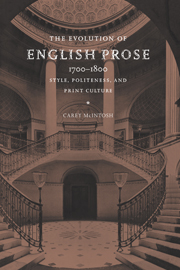Book contents
- Frontmatter
- Contents
- Preface
- 1 The ordering of English
- 2 Literacy and politeness: the gentrification of English prose
- 3 Testing the model
- 4 Loose and periodic sentences
- 5 Lofty language and low
- 6 Nominal and oral styles: Johnson and Richardson
- 7 The New Rhetoric of 1748 to 1793
- 8 The instruments of literacy
- 9 Politeness; feminization
- 10 Style and rhetoric
- Epilogue: language change
- References
- Index
4 - Loose and periodic sentences
Published online by Cambridge University Press: 18 December 2009
- Frontmatter
- Contents
- Preface
- 1 The ordering of English
- 2 Literacy and politeness: the gentrification of English prose
- 3 Testing the model
- 4 Loose and periodic sentences
- 5 Lofty language and low
- 6 Nominal and oral styles: Johnson and Richardson
- 7 The New Rhetoric of 1748 to 1793
- 8 The instruments of literacy
- 9 Politeness; feminization
- 10 Style and rhetoric
- Epilogue: language change
- References
- Index
Summary
My lines and life are free; free as the road,
Loose as the wind, as large as store.
(G. Herbert, “The Collar”: 1633)“Periodic” and “loose” sentences are ubiquitous in English prose and poetry. The stylistic contrast between these two modes of articulation has been recognized at least since Aristotle, and it continues to crop up in late twentieth-century rhetorics. Differences between loose and periodic may signify something about a passage's probable date (as we saw in chapter 2), its orality or writtenness (as in chapters 2, 3, and 6), its grandeur or humbleness (chapter 5); and, certainly, they modify what it can do to the reader, or for the author. Nevertheless, important as they are in the arts of language, periodicity and looseness have not been studied systematically.
Perhaps one reason for this neglect is that Aristotle supplied grounds for defining a period in grammatical terms, but Cicero conceived of the period as a rhythmic unit with grammatical bases. It is difficult to reconcile these two towering authorities! Cicero was of course better known during the three hundred years when classical ideals of prose style most strongly influenced writers in English. But no genuine equivalent to Cicero's periods is possible in English, because English poetic rhythms are accentual not quantitative. The central tradition of periodicity in English, therefore, is Aristotle's grammatical one, as discussed by John Ward, Blair, Whately, Lanham, and others. I shall begin by trying to clarify this tradition, reanalysing it in terms of syntax and semantics.
A periodic sentence, which delays its most important element to the last few words, lends itself naturally to certain kinds of emphasis.
- Type
- Chapter
- Information
- The Evolution of English Prose, 1700–1800Style, Politeness, and Print Culture, pp. 76 - 97Publisher: Cambridge University PressPrint publication year: 1998



